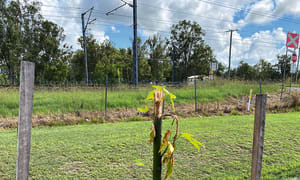It is not for nothing the people of Bowen are proud of the mango variety which began to emerge from a property called Kensington in the 1880s.
First called the Pride of Bowen, the mango later known as Kensington Pride is ranked among the world’s best varieties.
There are more than a few Queenslanders who will tell you, while picking at yellow strands of mango stuck between their teeth, that the Bowen is the world’s best mango.
And, of course, in classic Aussie fashion there is a 10-metre high Big Mango in the steamy north to celebrate that summer staple.
Today, Bowens account for over 80 percent of Australia’s mango production.
The numbers don’t lie: there is no doubt it is Australia’s favourite mango.
But, now, three new mystery challengers are preparing to vie for that status.
They are so mysterious, in fact, they don’t yet have names.
And the Queensland Government is looking to mango growers to help bring these new varieties into the world, give them names and get them on supermarket shelves as soon as this year.
Agriculture Minister Mark Furner said last week the Queensland Government was offering the “three elite mango varieties” for commercial development.
The varieties emerged from the National Mango Breeding Program, which was established in 1994 by several scientific and public organisations around Australia.
Popular and delicious as they are, Kensington Pride pose some serious challenges for growers which the breeding program hoped to overcome.
Low irregular yields, excessive vigour, short shelf life and “susceptibility to a range of pre- and post-harvest physiological disorders and diseases” are all issues identified by the program.
Researchers have been doing controlled crosses using Kensington Pride as the dominant paternal parent and a range of Indian, Floridian and Southeast Asian cultivars as the maternal parent.
Over the years, they have generated 1896 hybrids from 33 parental combinations.
Among them are the three new varieties currently described by researchers as NMBP-1201, NMBP-4069 and NMBP-1243.
NMBP-1201 is a hybrid cross between Irwin and Kensington Pride.
Its yield is said to be greater and more consistent than its Bowen progenitor.
It weighs an average of 361 grams and has “a soft red to dark red blush over a yellow background and sweet, rich KP-style flavour with a slight tang”.
“We’re very optimistic about these mango varieties and the long-term opportunities they bring for Australian growers,” Mr Furner said.
“We’re anticipating growers will be carefully watching the next stage of development of these varieties as a future option.”
The Queensland Government has been assigned the licensing rights on behalf of the program’s other research partners, the CSIRO, Western Australian Agriculture Authority and Northern Territory Department of Tourism, Industry and Trade.
Mr Furner said the Department of Agriculture and Fisheries would licence the intellectual property associated with the three mango varieties, with the successful licensee to manage propagation, growing and marketing of the fruit.
Mr Furner said the mango varieties could be on supermarket shelves soon.
“There are already more than 20 producers growing the varieties on orchards in Queensland, Western Australia, the Northern Territory and New South Wales,” the minister said.
“We’re hoping there will be small volumes of high-quality fruit available for the domestic market this season.”
“An export trial in Singapore is also being considered which would provide valuable consumer feedback and supply chain data going forward for the successful licensee.”
The Department of Agriculture and Fisheries has advertised for expressions of interest on the QTenders website to identify the most suitable business to manage the commercialisation activities.
An exclusive licence agreement is anticipated to be in place with the successful business for the 2022 season.
Those EOIs seek to identify “a suitably experienced and resourced business who can manage the commercialisation activities in Australia”.
The licensee would “manage the commercialisation of the three NMBP mango varieties to enhance the profitability of the Australian mango industry, build and maintain appropriate relationships with propagators, growers, marketing and export agents (if applicable), fresh wholesalers and retailers, processors and research and development providers develop and maintain variety profiles through branding and marketing strategies maintain security of the varieties to ensure no leakage and protect the Intellectual Property,” the EOI reads.
The agriculture minister said the new mangoes were among a string of innovations helping to make Queensland farmers “the best in the world”.
“The Department has more than 20 commercial licences based on research outcomes including another popular mango variety, pineapples, macadamia, citrus and stone fruit varieties,” he said.






